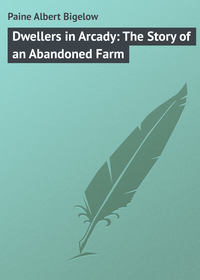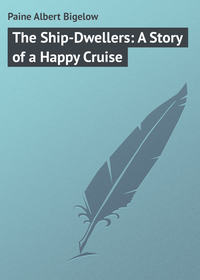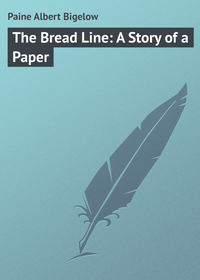 полная версия
полная версияMark Twain: A Biography. Volume II, Part 2: 1886-1900
I've got 16 working-days left yet, and in that time I will add another 120,000 words to my book if I have luck.
In his memoranda of this time he says:
There was never a throne which did not represent a crime. There is no throne to-day which does not represent a crime ….
Show me a lord and I will show you a man whom you couldn't tell from a journeyman shoemaker if he were stripped, and who, in all that is worth being, is the shoemaker's inferior; and in the shoemaker I will show you a dull animal, a poor-spirited insect; for there are enough of him to rise and chuck the lords and royalties into the sea where they belong, and he doesn't do it.
But his violence waned, maybe, for he did not finish the Yankee in the sixteen days as planned. He brought the manuscript back to Hartford, but found it hard work there, owing to many interruptions. He went over to Twichell's and asked for a room where he might work in seclusion. They gave him a big upper chamber, but some repairs were going on below. From a letter written to Theodore Crane we gather that it was not altogether quiet.
Friday, October 5, 1888.
DEAR THEO, I am here in Twichell's house at work, with the noise of the children and an army of carpenters to help: Of course they don't help, but neither do they hinder. It's like a boiler factory for racket, and in nailing a wooden ceiling on to the room under me the hammering tickles my feet amazingly sometimes and jars my table a good deal, but I never am conscious of the racket at all, and I move my feet into positions of relief without knowing when I do it. I began here Monday morning, and have done eighty pages since. I was so tired last night that I thought I would lie abed and rest to-day; but I couldn't resist. I mean to try to knock off tomorrow, but it's doubtful if I do. I want to finish the day the machine finishes, and a week ago the closest calculations for that indicated Oct. 22—but experience teaches me that the calculations will miss fire as usual.
The other day the children were projecting a purchase, Livy and I to furnish the money—a dollar and a half. Jean discouraged the idea. She said, "We haven't got any money. Children, if you would think, you would remember the machine isn't done."
It's billiards to-night. I wish you were here.
With love to you both, S. L. C.P. S. I got it all wrong. It wasn't the children, it was Marie.
She wanted a box of blacking for the children's shoes. Jean reproved her and said, "Why, Marie, you mustn't ask for things now.
The machine isn't done."
Neither the Yankee nor the machine was completed that fall, though returns from both were beginning to be badly needed. The financial pinch was not yet severe, but it was noticeable, and it did not relax.
A memorandum of this time tells of an anniversary given to Charles and Susan Warner in their own home. The guests assembled at the Clemens home, the Twichells among them, and slipped across to Warner's, entering through a window. Dinner was then announced to the Warners, who were sitting by their library fire. They came across the hall and opened the dining-room door, to be confronted by a table fully spread and lighted and an array of guests already seated.
CLXVIII
INTRODUCING NYE AND RILEY AND OTHERS
It was the winter (1888-89) that the Bill Nye and James Whitcomb Riley entertainment combination set out on its travels. Mark Twain introduced them to their first Boston audience. Major J. B. Pond was exploiting Nye and Riley, and Clemens went on to Boston especially to hear them. Pond happened upon him in the lobby of the Parker House and insisted that nothing would do but he must introduce them. In his book of memories which he published later Pond wrote:
He replied that he believed I was his mortal enemy, and determined that he should never have an evening's enjoyment in my presence. He consented, however, and conducted his brother-humorist and the Hoosier poet to the platform. Mark's presence was a surprise to the audience, and when they recognized him the demonstration was tremendous. The audience rose in a body, and men and women shouted at the very top of their voices. Handkerchiefs waved, the organist even opened every forte key and pedal in the great organ, and the noise went on unabated for minutes. It took some time for the crowd to get down to listening, but when they did subside, as Mark stepped to the front, the silence was as impressive as the noise had been.
He presented the Nye-Riley pair as the Siamese Twins. "I saw them first," he sand, "a great many years ago, when Mr. Barnum had them, and they were just fresh from Siam. The ligature was their best hold then, but literature became their best hold later, when one of them committed an indiscretion, and they had to cut the old bond to accommodate the sheriff."
He continued this comic fancy, and the audience was in a proper frame of mind, when he had finished, to welcome the "Twins of Genius" who were to entertain them:
Pond says:
It was a carnival of fun in every sense of the word. Bostonians will not have another such treat in this generation.
Pond proposed to Clemens a regular tour with Nye and Riley. He wrote:
I will go partners with you, and I will buy Nye and Riley's time and give an entertainment something like the one we gave in Boston. Let it be announced that you will introduce the "Twins of Genius." Ostensibly a pleasure trip for you. I will take one-third of the profits and you two-thirds. I can tell you it will be the biggest thing that can be brought before the American public.
But Clemens, badly as he was beginning to need the money, put this temptation behind him. His chief diversion these days was in gratuitous appearances. He had made up his mind not to read or lecture again for pay, but he seemed to take a peculiar enjoyment in doing these things as a benefaction. That he was beginning to need the money may have added a zest to the joy of his giving. He did not respond to all invitations; he could have been traveling constantly had he done so. He consulted with Mrs. Clemens and gave himself to the cause that seemed most worthy. In January Col. Richard Malcolm Johnston was billed to give a reading with Thomas Nelson Page in Baltimore. Page's wife fell ill and died, and Colonel Johnston, in extremity, wired Charles Dudley Warner to come in Page's place. Warner, unable to go, handed the invitation to Clemens, who promptly wired that he would come. They read to a packed house, and when the audience was gone and the returns had been counted an equal division of the profits was handed to each of the authors. Clemens pushed his share over to Johnston, saying:
"That's yours, Colonel. I'm not reading for money these days."
Colonel Johnston, to whom the sum was important, tried to thank him, but he only said:
"Never mind, Colonel, it only gave me pleasure to do you that little favor. You can pass it on some day."
As a matter of fact, hard put to it as he was for funds, Clemens at this time regarded himself as a potential multi-millionaire. The type-setting machine which for years had been sapping his financial strength was believed to be perfected, and ship-loads of money were waiting in the offing. However, we shall come to this later.
Clemens read for the cadets at West Point and for a variety of institutions and on many special occasions. He usually gave chapters from his Yankee, now soon to be finished, chapters generally beginning with the Yankee's impression of the curious country and its people, ending with the battle of the Sun-belt, when the Yankee and his fifty-four adherents were masters of England, with twenty-five thousand dead men lying about them. He gave this at West Point, including the chapter where the Yankee has organized a West Point of his own in King Arthur's reign.
In April, '89, he made an address at a dinner given to a victorious baseball team returning from a tour of the world by way of the Sandwich Islands. He was on familiar ground there. His heart was in his words.
He began:
I have been in the Sandwich Islands-twenty-three years ago—that peaceful land, that beautiful land, that far-off home of solitude, and soft idleness, and repose, and dreams, where life is one long slumberous Sabbath, the climate one long summer day, and the good that die experience no change, for they but fall asleep in one heaven and wake up in another. And these boys have played baseball there!—baseball, which is the very symbol, the outward and visible expression, of the drive and push and rush and struggle of the living, tearing, booming nineteenth, the mightiest of all the centuries!
He told of the curious island habits for his hearers' amusement, but at the close the poetry of his memories once more possessed him:
Ah, well, it is refreshment to the jaded, it is water to the thirsty, to look upon men who have so lately breathed the soft air of those Isles of the Blest and had before their eyes the inextinguishable vision of their beauty. No alien land in all the earth has any deep, strong charm for me but that one; no other land could so longingly and so beseechingly haunt me, sleeping and waking, through half a lifetime, as that one has done. Other things leave me, but it abides; other things change, but it remains the same. For me its balmy airs are always blowing, its summer seas flashing in the sun; the pulsing of its surf is in my ear; I can see its garlanded crags, its leaping cascades, its plumy palms drowsing by the shore, its remote summits floating like islands above the cloud-rack; I can feel the spirit of its woody solitudes, I hear the plashing of the brooks; in my nostrils still lives the breath of flowers that perished twenty years ago.
CLXIX
THE COMING OF KIPLING
It was the summer of 1889 that Mark Twain first met Rudyard Kipling. Kipling was making his tour around the world, a young man wholly unheard of outside of India. He was writing letters home to an Indian journal, The Pioneer, and he came to Elmira especially to see Mark Twain. It was night when he arrived, and next morning some one at the hotel directed him to Quarry Farm. In a hired hack he made his way out through the suburbs, among the buzzing planing-mills and sash factories, and toiled up the long, dusty, roasting east hill, only to find that Mark Twain was at General Langdon's, in the city he had just left behind. Mrs. Crane and Susy Clemens were the only ones left at the farm, and they gave him a seat on the veranda and brought him glasses of water or cool milk while he refreshed them with his talk-talk which Mark Twain once said might be likened to footprints, so strong and definite was the impression which it left behind. He gave them his card, on which the address was Allahabad, and Susy preserved it on that account, because to her India was a fairyland, made up of magic, airy architecture, and dark mysteries. Clemens once dictated a memory of Kipling's visit.
Kipling had written upon the card a compliment to me. This gave it an additional value in Susy's eyes, since, as a distinction, it was the next thing to being recognized by a denizen of the moon.
Kipling came down that afternoon and spent a couple of hours with me, and at the end of that time I had surprised him as much as he had surprised me—and the honors were easy. I believed that he knew more than any person I had met before, and I knew that he knew that I knew less than any person he had met before—though he did not say it, and I was not expecting that he would. When he was gone Mrs. Langdon wanted to know about my visitor. I said:
"He is a stranger to me, but he is a most remarkable man—and I am the other one. Between us we cover all knowledge; he knows all that can be known, and I know the rest."
He was a stranger to me and to all the world, and remained so for twelve months, then he became suddenly known, and universally known. From that day to this he has held this unique distinction—that of being the only living person, not head of a nation, whose voice is heard around the world the moment it drops a remark; the only such voice in existence that does not go by slow ship and rail, but always travels first-class—by cable.
About a year after Kipling's visit in Elmira George Warner came into our library one morning in Hartford with a small book in his hand and asked me if I had ever heard of Rudyard Kipling. I said, "No."
He said I would hear of him very soon, and that the noise he was going to make would be loud and continuous. The little book was the Plain Tales, and he left it for me to read, saying it was charged with a new and inspiriting fragrance, and would blow a refreshing breath around the world that would revive the nations. A day or two later he brought a copy of the London World which had a sketch of Kipling in it, and a mention of the fact that he had traveled in the United States. According to this sketch he had passed through Elmira. This remark, with the additional fact that he hailed from India, attracted my attention—also Susy's. She went to her room and brought his card from its place in the frame of her mirror, and the Quarry Farm visitor stood identified.
Kipling also has left an account of that visit. In his letter recording it he says:
You are a contemptible lot over yonder. Some of you are Commissioners and some are Lieutenant-Governors, and some have the V. C., and a few are privileged to walk about the Mall arm in arm with the Viceroy; but I have seen Mark Twain this golden morning, have shaken his hand and smoked a cigar—no, two cigars—with him, and talked with him for more than two hours! Understand clearly that I do not despise you; indeed, I don't. I am only very sorry for you, from the Viceroy downward.
A big, darkened drawing-room; a huge chair; a man with eyes, a mane of grizzled hair, a brown mustache covering a mouth as delicate as a woman's, a strong, square hand shaking mine, and the slowest, calmest, levelest voice in all the world saying:
"Well, you think you owe me something, and you've come to tell me so. That's what I call squaring a debt handsomely."
"Piff!" from a cob-pipe (I always said that a Missouri meerschaum was the best smoking in the world), and behold! Mark Twain had curled himself up in the big arm-chair, and I was smoking reverently, as befits one in the presence of his superior.
The thing that struck me first was that he was an elderly man; yet, after a minute's thought, I perceived that it was otherwise, and in five minutes, the eyes looking at me, I saw that the gray hair was an accident of the most trivial. He was quite young. I was shaking his hand. I was smoking his cigar, and I was hearing him talk—this man I had learned to love and admire fourteen thousand miles away.
Reading his books, I had striven to get an idea of his personality, and all my preconceived notions were wrong and beneath the reality. Blessed is the man who finds no disillusion when he is brought face to face with a revered writer.
The meeting of those two men made the summer of '89 memorable in later years. But it was recalled sadly, too. Theodore Crane, who had been taken suddenly and dangerously ill the previous autumn, had a recurring attack and died July 3d. It was the first death in the immediate families for more than seventeen years, Mrs. Clemens, remembering that earlier period of sorrow, was depressed with forebodings.
CLXX
"THE PRINCE AND THE PAUPER" ON THE STAGE
There was an unusual dramatic interest in the Clemens home that autumn. Abby Sage Richardson had dramatized 'The Prince and the Pauper', and Daniel Frohman had secured Elsie Leslie (Lyde) to take the double role of the Prince and Tom Canty. The rehearsals were going on, and the Clemens children were naturally a good deal excited over the outcome. Susy Clemens was inspired to write a play of her own—a pretty Greek fancy, called "The Triumph of Music," and when it was given on Thanksgiving night, by herself, with Clara and Jean and Margaret Warner, it was really a lovely performance, and carried one back to the days when emotions were personified, and nymphs haunted the seclusions of Arcady. Clemens was proud of Susy's achievement, and deeply moved by it. He insisted on having the play repeated, and it was given again later in the year.
Pretty Elsie Leslie became a favorite of the Clemens household. She was very young, and when she visited Hartford Jean and she were companions and romped together in the hay-loft. She was also a favorite of William Gillette. One day when Clemens and Gillette were together they decided to give the little girl a surprise—a unique one. They agreed to embroider a pair of slippers for her—to do the work themselves. Writing to her of it, Mark Twain said:
Either one of us could have thought of a single slipper, but it took both of us to think of two slippers. In fact, one of us did think of one slipper, and then, quick as a flash, the other of the other one. It shows how wonderful the human mind is….
Gillette embroidered his slipper with astonishing facility and splendor, but I have been a long time pulling through with mine. You see, it was my very first attempt at art, and I couldn't rightly get the hang of it along at first. And then I was so busy that I couldn't get a chance to work at it at home, and they wouldn't let me embroider on the cars; they said it made the other passengers afraid. They didn't like the light that flared into my eye when I had an inspiration. And even the most fair-minded people doubted me when I explained what it was I was making—especially brakemen. Brakemen always swore at it and carried on, the way ignorant people do about art. They wouldn't take my word that it was a slipper; they said they believed it was a snow-shoe that had some kind of disease.
He went on to explain and elucidate the pattern of the slipper, and how Dr. Root had come in and insisted on taking a hand in it, and how beautiful it was to see him sit there and tell Mrs. Clemens what had been happening while they were away during the summer, holding the slipper up toward the end of his nose, imagining the canvas was a "subject" with a scalp-wound, working with a "lovely surgical stitch," never hesitating a moment in his talk except to say "Ouch!" when he stuck himself with the needle.
Take the slippers and wear them next your heart, Elsie dear; for every stitch in them is a testimony of the affection which two of your loyalest friends bear you. Every single stitch cost us blood. I've got twice as many pores in me now as I used to have; and you would never believe how many places you can stick a needle in yourself until you go into the embroidery line and devote yourself to art.
Do not wear these slippers in public, dear; it would only excite envy; and, as like as not, somebody would try to shoot you.
Merely use them to assist you in remembering that among the many, many people who think all the world of you is your friend,
MARK TWAIN.The play of "The Prince and the Pauper," dramatized by Mrs. Richardson and arranged for the stage by David Belasco, was produced at the Park Theater, Philadelphia, on Christmas Eve. It was a success, but not a lavish one. The play was well written and staged, and Elsie Leslie was charming enough in her parts, but in the duality lay the difficulty. The strongest scenes in the story had to be omitted when one performer played both Tom Canty and the little Prince. The play came to New York—to the Broadway Theater—and was well received. On the opening night there Mark Twain made a speech, in which he said that the presentation of "The Prince and the Pauper" realized a dream which fifteen years before had possessed him all through a long down-town tramp, amid the crowds and confusion of Broadway. In Elsie Leslie, he said, he had found the embodiment of his dream, and to her he offered homage as the only prince clothed in a divine right which was not rags and sham—the divine right of an inborn supremacy in art.
It seems incredible to-day that, realizing the play's possibilities as Mark Twain did, and as Belasco and Daniel Frohman must have done, they did not complete their partial triumph by finding another child actress to take the part of Tom Canty. Clemens urged and pleaded with them, but perhaps the undertaking seemed too difficult—at all events they did not find the little beggar king. Then legal complications developed. Edward House, to whom Clemens had once given a permission to attempt a dramatization of the play, suddenly appeared with a demand for recognition, backed by a lawsuit against all those who had a proprietary interest in the production. House, with his adopted Japanese daughter Koto, during a period of rheumatism and financial depression, had made a prolonged visit in the Clemens home and originally undertook the dramatization as a sort of return for hospitality. He appears not to have completed it and to have made no arrangement for its production or to have taken any definite step until Mrs. Richardson's play was profitably put on; whereupon his suit and injunction.
By the time a settlement of this claim had been reached the play had run its course, and it was not revived in that form. It was brought out in England, where it was fairly prosperous, though it seems not to have been long continued. Variously reconstructed, it has occasionally been played since, and always, when the parts of Tom Canty and the Prince were separate, with great success. Why this beautiful drama should ever be absent from the boards is one of the unexplainable things. It is a play for all times and seasons, the difficulty of obtaining suitable "twin" interpreters for the characters of the Prince and the Pauper being its only drawback.
CLXXI
"A CONNECTICUT YANKEE IN KING ARTHUR'S COURT"
From every point of view it seemed necessary to make the 'Yankee in King Arthur's Court' an important and pretentious publication. It was Mark Twain's first book after a silence of five years; it was a book badly needed by his publishing business with which to maintain its prestige and profit; it was a book which was to come out of his maturity and present his deductions, as to humanity at large and kings in particular, to a waiting public. It was determined to spare no expense on the manufacture, also that its illustrations must be of a sort to illuminate and, indeed, to elaborate the text. Clemens had admired some pictures made by Daniel Carter ("Dan") Beard for a Chinese story in the Cosmopolitan, and made up his mind that Beard was the man for the Yankee. The manuscript was sent to Beard, who met Clemens a little later in the office of Webster & Co. to discuss the matter. Clemens said:
"Mr. Beard, I do not want to subject you to any undue suffering, but I wish you would read the book before you make the pictures."
Beard replied that he had already read it twice.
"Very good," Clemens said; "but I wasn't led to suppose that that was the usual custom among illustrators, judging from some results I have seen. You know," he went on, "this Yankee of mine has neither the refinement nor the weakness of a college education; he is a perfect ignoramus; he is boss of a machine shop; he can build a locomotive or a Colt's revolver, he can put up and run a telegraph line, but he's an ignoramus, nevertheless. I am not going to tell you what to draw. If a man comes to me and says, 'Mr. Clemens, I want you to write me a story,' I'll write it for him; but if he undertakes to tell me what to write I'll say, 'Go hire a typewriter.'"
To Hall a few days later he wrote:
Tell Beard to obey his own inspirations, and when he sees a picture in his mind put that picture on paper, be it humorous or be it serious. I want his genius to be wholly unhampered. I sha'n't have any fear as to results.
Without going further it is proper to say here that the pictures in the first edition of A Connecticut Yankee in King Arthur's Court justified the author's faith in the artist of his selection. They are far and away Dan Beard's best work. The socialism of the text strongly appealed to him. Beard himself had socialistic tendencies, and the work inspired him to his highest flights of fancy and to the acme of his technic. Clemens examined the pictures from time to time, and once was moved to write:
My pleasure in them is as strong and as fresh as ever. I do not know of any quality they lack. Grace, dignity, poetry, spirit, imagination, these enrich them and make them charming and beautiful; and wherever humor appears it is high and fine—easy, unforced, kept under, masterly, and delicious.









